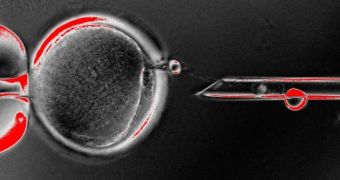This week's issue of the scientific journal Cell witnessed the publication of a new study detailing how a team of researchers have succeeded in cloning human embryos and using them to harvest patient-specific stem cells.
As these specialists explain, human embryonic stem cells have the ability to turn into any kind of cell that happens to be part and parcel of the human body.
Because of this, several theories suggest that they could be used to treat illnesses ranging from Alzheimer's and Parkinson's to diabetes and spinal cord injuries.
Up until now, the only downside to this problem was that an individual's organism was fairly likely to reject these new cells on account of their having a different genetic make-up.
The researchers who worked on creating these cloned embryonic stem cells believe that, because of their being patient-specific, they can successfully be used to treat said conditions without their being rejected by the body.
Nature informs us that these experiments were carried out by Shoukhrat Mitalipov, a reproductive biology specialist currently working with the Oregon Health and Science University in Beaverton, together with several other researchers.
The techniques they used in order to roll out these cloned embryonic stem cells were roughly the same employed when Dolly (i.e. the cloned sheep) was created.
Thus, a donor cell was made to fuse with an unfertilized egg whose nucleus had been previously removed by the researchers.
The specialist then toyed with the DNA in the cell, compelling the latter to return to the embryonic state and begin dividing, the same source explains.
This process of cellular division was allowed to continue until the blastocyst stage, when the cells were harvested and cultured in order to obtain lines of embryonic stem cells.
Further tests revealed that the cells obtained in this manner were indeed capable of morphing into either heart cells or other cell types.
Although many are bound to condemn this achievement on ethical and moral grounds, the researchers wish to stress the fact that the process is merely intended to create patient-specific human embryonic stem cells, and that it is not designed to produce human clones.

 14 DAY TRIAL //
14 DAY TRIAL //